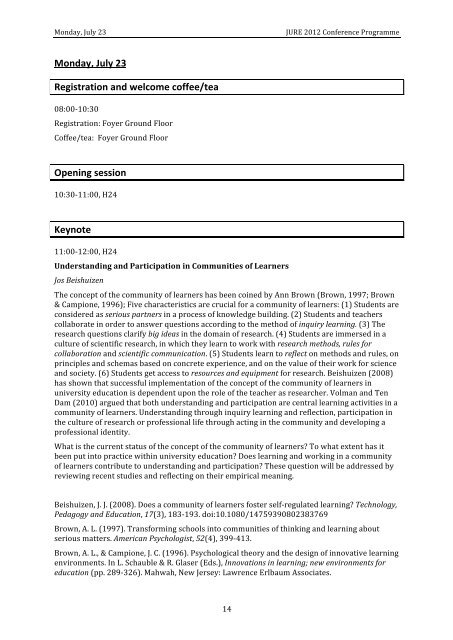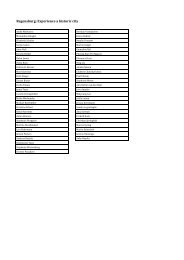JURE 2012 Programme book - EARLI Jure 2012
JURE 2012 Programme book - EARLI Jure 2012
JURE 2012 Programme book - EARLI Jure 2012
You also want an ePaper? Increase the reach of your titles
YUMPU automatically turns print PDFs into web optimized ePapers that Google loves.
Monday, July 23 <strong>JURE</strong> <strong>2012</strong> Conference <strong>Programme</strong><br />
Monday, July 23<br />
Registration and welcome coffee/tea<br />
08:00-‐10:30<br />
Registration: Foyer Ground Floor<br />
Coffee/tea: Foyer Ground Floor<br />
Opening session<br />
10:30-‐11:00, H24<br />
Keynote<br />
11:00-‐12:00, H24<br />
Understanding and Participation in Communities of Learners<br />
Jos Beishuizen<br />
The concept of the community of learners has been coined by Ann Brown (Brown, 1997; Brown<br />
& Campione, 1996); Five characteristics are crucial for a community of learners: (1) Students are<br />
considered as serious partners in a process of knowledge building. (2) Students and teachers<br />
collaborate in order to answer questions according to the method of inquiry learning. (3) The<br />
research questions clarify big ideas in the domain of research. (4) Students are immersed in a<br />
culture of scientific research, in which they learn to work with research methods, rules for<br />
collaboration and scientific communication. (5) Students learn to reflect on methods and rules, on<br />
principles and schemas based on concrete experience, and on the value of their work for science<br />
and society. (6) Students get access to resources and equipment for research. Beishuizen (2008)<br />
has shown that successful implementation of the concept of the community of learners in<br />
university education is dependent upon the role of the teacher as researcher. Volman and Ten<br />
Dam (2010) argued that both understanding and participation are central learning activities in a<br />
community of learners. Understanding through inquiry learning and reflection, participation in<br />
the culture of research or professional life through acting in the community and developing a<br />
professional identity.<br />
What is the current status of the concept of the community of learners? To what extent has it<br />
been put into practice within university education? Does learning and working in a community<br />
of learners contribute to understanding and participation? These question will be addressed by<br />
reviewing recent studies and reflecting on their empirical meaning.<br />
Beishuizen, J. J. (2008). Does a community of learners foster self-‐regulated learning? Technology,<br />
Pedagogy and Education, 17(3), 183-‐193. doi:10.1080/14759390802383769<br />
Brown, A. L. (1997). Transforming schools into communities of thinking and learning about<br />
serious matters. American Psychologist, 52(4), 399-‐413.<br />
Brown, A. L., & Campione, J. C. (1996). Psychological theory and the design of innovative learning<br />
environments. In L. Schauble & R. Glaser (Eds.), Innovations in learning; new environments for<br />
education (pp. 289-‐326). Mahwah, New Jersey: Lawrence Erlbaum Associates.<br />
14



